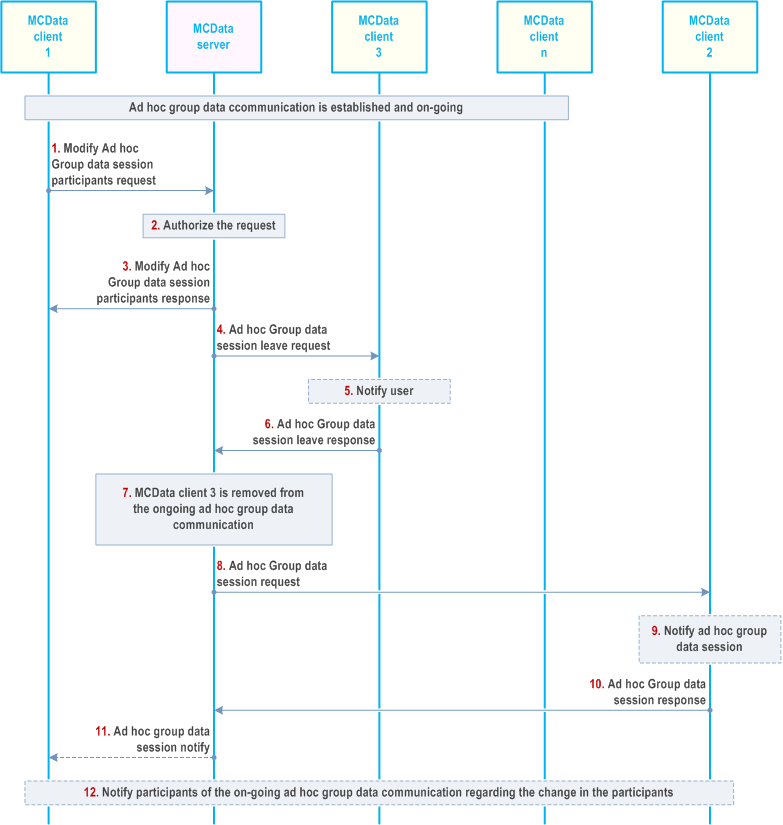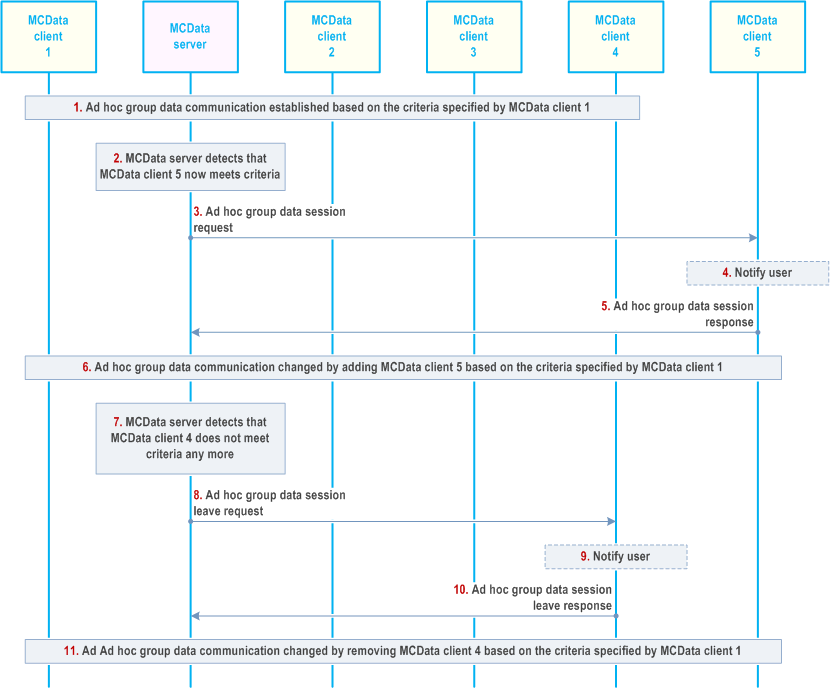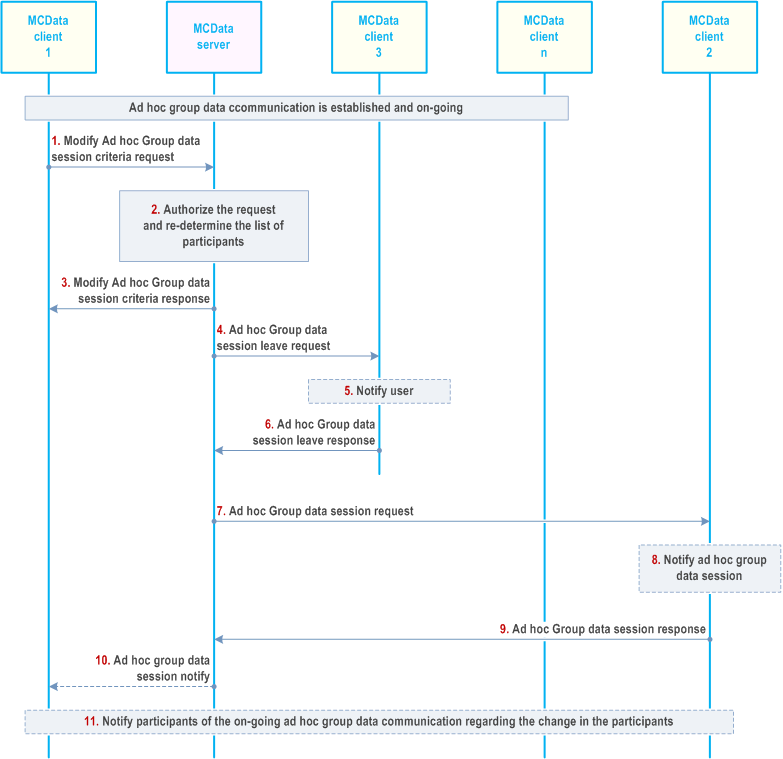Content for TS 23.282 Word version: 19.3.0
1…
5…
6…
6.6…
7…
7.4…
7.4.2.1.10…
7.4.2.2…
7.4.2.5…
7.4.2.8…
7.4.3…
7.5…
7.5.2.1.12…
7.5.2.2…
7.5.2.4…
7.5.2.6…
7.5.2.8…
7.5.2.11…
7.5.2.14…
7.5.3…
7.6
7.7…
7.7.2.1.13…
7.7.2.2…
7.8…
7.9…
7.13…
7.13.3.1.19…
7.13.3.2…
7.13.3.8…
7.13.3.16…
7.13.4…
7.14…
7.14.2.2…
7.17…
7.17.2.13…
7.17.3…
7.17.3.1.4…
7.17.3.2…
7.17.3.2.4…
7.17.3.2.6…
7.17.4…
7.17.6…
7.17.7…
A…
B…
7.17.3.1.4 Modification of ad hoc group data communication participants by an authorized user
7.17.3.1.5 Modification of ad hoc group data communication participants by the MCData server
7.17.3.1.6 Modification of ad hoc group data communication criteria by an authorized user
...
...
7.17.3.1.4 Modification of ad hoc group data communication participants by an authorized user p. 238
Figure 7.17.3.1.4-1 below illustrates the modification of ad hoc group data communication participants procedure by an authorized user.
Pre-conditions:
- An MCData ad hoc group data communication is already in progress the participants list is provided by the originating MCData user while initiating the MCData ad hoc group data communication.
- The participants of the MCData ad hoc group call belong to the single MCData system.
- The MCData users on MCData client 1, MCData client 3 to MCData client n are on an ongoing ad hoc group data communication.
- The MCData user at MCData client 1 determines to remove the user of MCData client 3 from the ad hoc group data communication and add user of MCData client 2 into the on-going ad hoc group data communication.

Step 1.
The MCData user at the MCData client 1 is authorized and requests to modify ad hoc group data communication participants. The MCData client 1 sends the modify ad hoc group data session participants request to the MCData server in order to remove MCData client 3 from the ongoing ad hoc group data communication and add MCData client 2 into it.
Step 2.
The MCData server verifies whether the MCData client 1 is authorized to add or remove (modify) the participants of the on-going ad hoc group data communication regardless of the original group call setup parameters. When the group participants were initially determined by the MCData server with criteria and MCData users are to be removed, the MCData server removes MCData clients and marks them so that the MCData server will not add them back to the ad hoc group call based on the criteria. Participants to be added shall be kept in the ad hoc group call and shall not be removed by the MCData server even if they do not meet the call criteria.
Step 3.
The MCData server sends modify ad hoc group data session participants response to the MCData client 1.
Step 4.
The MCData server sends the ad hoc group data session leave request to the MCData client 3 in order to remove it from the on-going ad hoc group data communication.
Step 5.
The MCData client 3 notifies the user of the ad hoc group data session leave request.
Step 6.
The MCData client 3 sends the ad hoc group data session leave response to the MCData server.
Step 7.
The MCData server sends the ad hoc group data session request towards MCData client 2.
Step 8.
The receiving MCData client 2 notifies the user about the incoming ad hoc group data communication.
Step 9.
The MCData client 2 accepts the ad hoc group data session request and send ad hoc group data session responses to the MCData server. The response may also contain a functional alias of the responding MCData user, which is verified (valid and activated for the user) by the MCData server. The MCData server considers the MCData user as implicitly affiliated to the ad hoc group.
Step 10.
The MCData server may notify the initiating MCData user of all the users who are added to the on-going ad hoc group data communication. This notification may be sent to the initiating MCData user by the MCData server more than once during the data communication when MCData users join or leave the ad hoc group data communication.
Step 11.
The MCData server may notify the participants about the change in the participants of on-going ad hoc group data communication.
7.17.3.1.5 Modification of ad hoc group data communication participants by the MCData server p. 240
Figure 7.17.3.1.5-1 below illustrates the modification of ad hoc group data communication participants procedure by the MCData server.
Pre-conditions:
- The MCData client 1 is the initiator of the ad hoc group data communication.
- MCData server determined the participants for the ad hoc group data communication based on the criteria specified by the MCData client 1 while initiating the ad hoc group data communication.
- MCData server continuously evaluates the criteria to monitor the list of users who meets or not meets the criteria for participating in the on-going ad hoc group data communication.
- The MCData server detects that the MCData client 5 satisfies the criteria and MCData client 4 stops to meet the criteria specified by the MCData client 1.

Step 1.
The ad hoc group data communication is established and on-going with the participants MCData client 1, MCData client 2, MCData client 3 and MCData client 4. The participants list is determined by the MCData server based on the criteria specified by the MCData client 1 while initiating the data communication.
Step 2.
The MCData server detects that the MCData client 5 satisfies the criteria specified by the MCData client.
Step 3.
The MCData server sends the ad hoc group data session request to the MCData client 5.
Step 4.
The MCData client 5 notifies the user about the incoming ad hoc group data communication.
Step 5.
The MCData client 5 accepts the ad hoc group data session request and sends the ad hoc group data session response to the MCData server.
Step 6.
The on-going ad hoc group data communication is updated by adding MCData client 5 which satisfies the criteria specified by the MCData client 1.
Step 7.
The MCData server detects that the MCData client 4 is no more satisfying the criteria to be the participant of the ad hoc group data communication.
Step 8.
The MCData server sends the ad hoc group data communication leave request to the MCData client 4 and removes it from the on-going ad hoc group data communication.
Step 9.
The MCData client 4 notifies the user of the ad hoc group data session leave request.
Step 10.
The MCData client 4 sends the ad hoc group data session leave response to the MCData server.
Step 11.
The on-going ad hoc group data communication is updated by removing MCData client 4, which no more satisfies the criteria specified by the MCData client 1.
7.17.3.1.6 Modification of ad hoc group data communication criteria by an authorized user |R19| p. 242
Figure 7.17.3.1.6-1 below illustrates the modification of ad hoc group data communication criteria procedure by the initiator of the ad hoc group data communication.
Pre-conditions:
- The MCData user 1 at the MCData client 1 is authorized to modify the criteria.
- Both the MCData server and the MCData client 1 are aware of the criteria related to the ongoing ad hoc group data communication.

Step 1.
The MCData server continuously checks whether other MCData clients meet or if participating MCData clients no longer meet the criteria for the ad hoc group emergency call.
The MCData user at the MCData client 1 is authorized and requests to modify the criteria for determining the list of participants. The MCData client 1 sends the modify ad hoc group data session criteria request to the MCData server which contains an updated criteria to determine the list of participants.
Step 2.
The MCData server verifies whether the MCData client 1 is authorized to modify the criteria which determines the list of participants during on-going ad hoc group data communication. The MCData server determines the list of ad hoc group call participants based on the criteria provided and indentifies that MCData client 3 is to be removed from and MCData client 2 is to be added to the group.
Step 3.
The MCData server sends modify ad hoc group data session criteria response to the MCData client 1.
Step 4.
The MCData server sends the ad hoc group data session leave request to the MCData client 3 in order to remove it from the on-going ad hoc group data communication.
Step 5.
The MCData client 3 notifies the user of the ad hoc group data session leave request.
Step 6.
The MCData client 3 sends the ad hoc group data session leave response to the MCData server.
Step 7.
The MCData server sends the ad hoc group data session request towards MCData client 2.
Step 8.
The receiving MCData client 2 notifies the user about the incoming ad hoc group data communication. The MCData server considers the MCData user as implicitly affiliated to the ad hoc group.
Step 9.
The MCData client 2 accepts the ad hoc group data session request and send ad hoc group data session responses to the MCData server. The response may also contain a functional alias of the responding MCData user, which is verified (valid and activated for the user) by the MCData server.
Step 10.
The MCData server may notify the initiating MCData user of all the users who are added to the on-going ad hoc group data communication. This notification may be sent to the initiating MCData user by the MCData server more than once during the data communication when MCData users join or leave the ad hoc group data communication.
Step 11.
The MCData server may notify the authorized participants about the change in the participants list of on-going ad hoc group data communication.